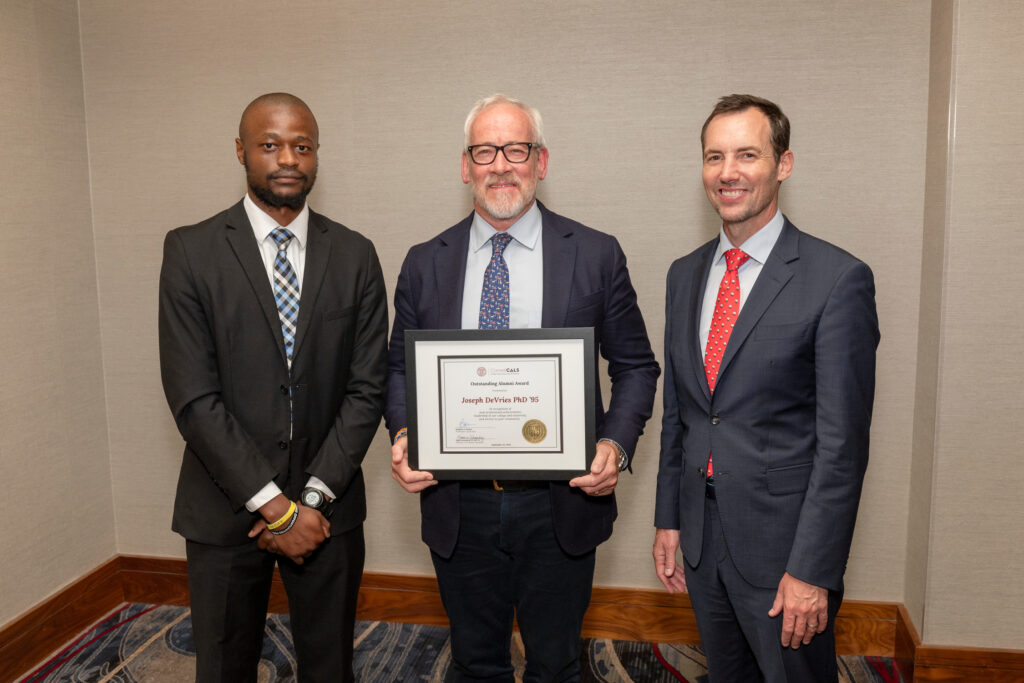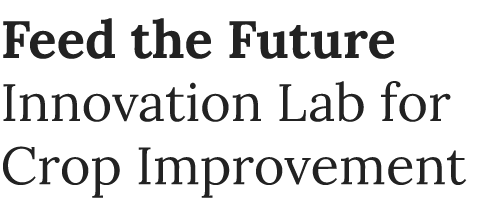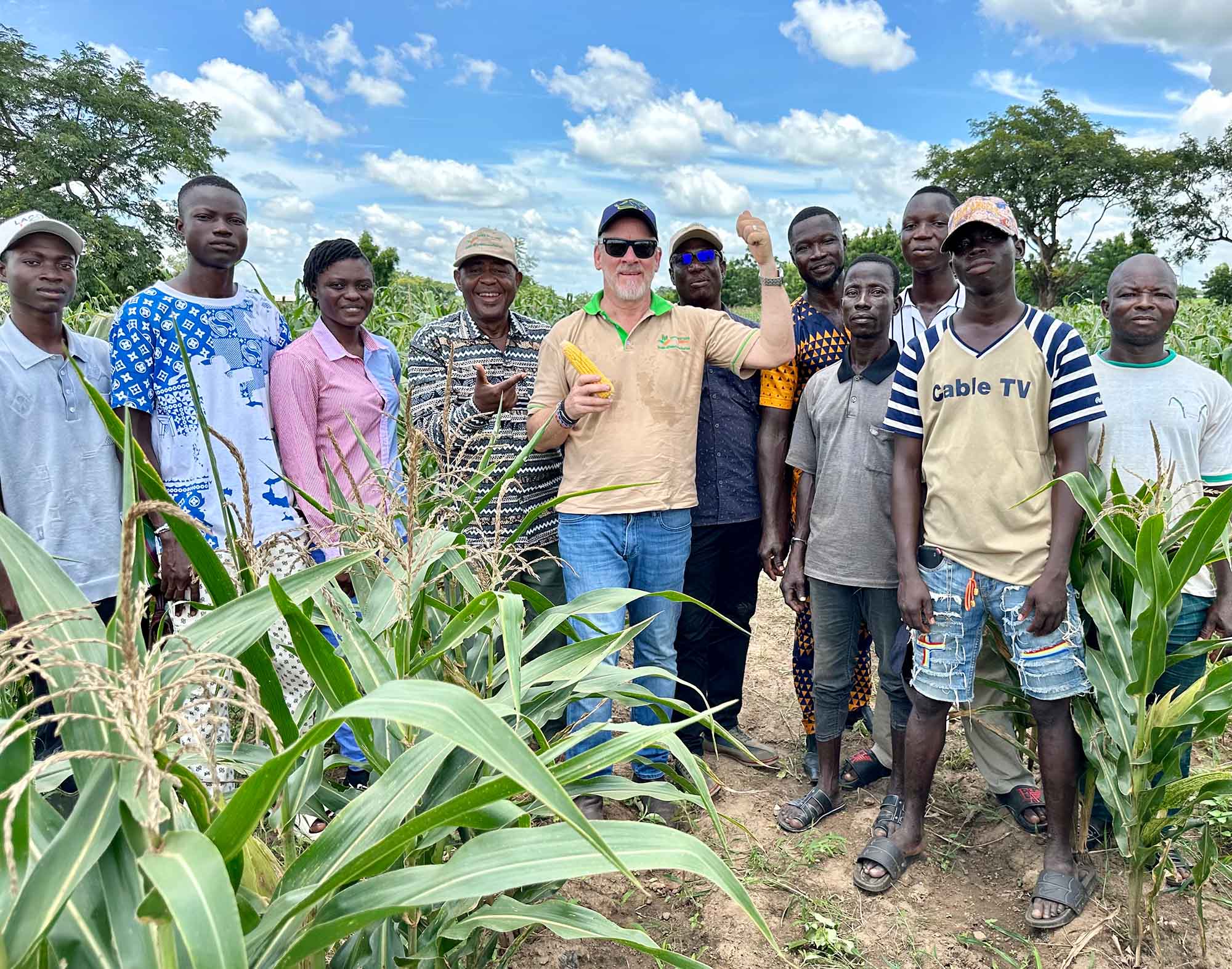Joe DeVries’ commitment to empowering smallholder farmers and scientists in Africa has staved off hunger, eased conflict and provided a model for bottom-up capacity building that will benefit generations of Africans. In honor of his contributions, DeVries, Ph.D. ’95, has been awarded the 2024 Outstanding Alumni Award from Cornell University’s College of Agriculture and Life Sciences’ (CALS) Alumni Association.
“Joe is one of the highly visible game changers and history makers on the African continent in agricultural development,” said Eric Danquah, foundation president of the African Plant Breeders Association and professor of genetics and founding director of the West Africa Centre for Crop Improvement (WACCI).
The CALS Alumni Association’s Outstanding Alumni Award recognizes alumni who demonstrate outstanding and uncommon achievement and distinguished public service. Recipients are committed and proven leaders who are a positive reflection of CALS and Cornell. DeVries is one of four 2024 Outstanding Alumni Award recipients.
DeVries first went to Africa in 1986 as a volunteer for the United Nations in Mali to build irrigation systems. He then joined World Vision International, where he helped lead relief and humanitarian initiatives in Mali and Mozambique, which were being ravaged by drought, war and famine. The team he led in Mozambique distributed over 2,000 metric tons of seed annually to farmers living behind the lines of the protracted civil war.
That experience launched DeVries on a career dedicated to supporting smallholder farmers in Africa.
“Joe DeVries has been incredibly successful working at the intersection of science, policy, development and the reality of smallholder farmers in some of the most challenging settings in the world,” said Margaret Smith, professor of plant breeding and genetics in the School of Integrative Plant Science and professor in the Department of Global Development. She also serves as director of the Cornell University Agricultural Experiment Station.
Smith, who advised DeVries during his doctoral program at Cornell, praised his exceptional dedication to supporting those in need through agriculture.
“Joe arrived at Cornell with an intense motivation to improve the lives of smallholder farmers in Africa. He tackled a Ph.D. research topic that was directly relevant to their circumstances and then wrote his dissertation in record time, pointing out to me that a dissertation was just getting words on the paper, while there were people out there that needed help now. I have rarely, if ever, come across a person so committed to helping those most in need through agriculture, plant breeding and seed systems. Joe has had a truly outsize impact in exceedingly difficult circumstances,” Smith said.
After earning his Ph.D. at Cornell, DeVries returned to Africa and built on the model he and the World Vision team developed in Mozambique, which combined immediate relief with long-term development. It has since been replicated in Angola, Democratic Republic of Congo, Liberia, Sierra Leone, Rwanda, Sudan and Somalia.
With Ronnie Coffman, international professor emeritus of plant breeding and genetics, Danquah and other African scientists, DeVries helped establish the African Centre for Crop Improvement (ACCI) in South Africa and WACCI in Ghana. Both centers were established with the goal of building long-term scientific capacity in Africa for Africa, and both have become leaders in plant breeding on the continent. DeVries and Coffman were jointly awarded the Distinguished Award for Meritorious Service from the African Plant Breeders Association for their work.
“Joe is one of Cornell’s foremost agricultural leaders on the ground internationally,” Coffman said. “Whether focused on infrastructure like irrigation systems, improving university research opportunities for Africans, training local farmers in seed use, assisting dealers in distributing and developing new seed, or helping local governments defuse policy barriers that impair seed distribution and use, DeVries has helped transform agriculture in Africa.”

Joe DeVries, Ph. ’95, center, with the 2024 Outstanding Alumni Award, with student Jensen Njagi ’25 and Benjamin Houlton, the Ronald P. Lynch Dean of CALS. Photo by Simon Wheeler.
DeVries also co-founded the Alliance for a Green Revolution in Africa (AGRA), which stemmed from a model for growing public-private seed production and delivery systems DeVries developed with the Rockefeller Foundation. DeVries designed and led AGRA’s Program for Africa’s Seed Systems for 10 years.
“That project has led to the release of over 600 improved varieties across Africa,” Danquah said. “I am not aware of a single project on the African continent which has yielded benefits like the AGRA seed systems program.”
Now, DeVries is president of the Seed Systems Group, which helps develop seed production and delivery systems in 15 left-behind countries of Africa, serving as a bridge between farmers, donors and governments, marshaling resources to support farmers’ seed needs, conducting crop variety trials and increasing farmer awareness of improved varieties. He’s also led systems initiatives for the Feed the Future Innovation Lab for Crop Improvement, which works to develop improved, climate-resilient seed for growers in Haiti and Senegal.
“Joe’s insights and experiences as a trailblazer have provided a wealth of information and guidance as we move the Innovation Lab forward,” said Stephen Kresovich, ILCI director and professor of plant breeding and genetics in the School of Integrative Plant Science (SIPS) in the College of Agriculture and Life Sciences and the Robert and Lois Coker Trustees Chair of Genetics at Clemson University.
“He’s an essential intellectual and operational bridge between science and delivery. He understands impact better than most,” Kresovich added.




